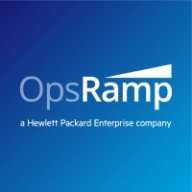

OpsRamp and Devo are competing products in the IT operations management space. Devo is often seen as superior due to its features, which many users find worth the higher cost.
Features: OpsRamp is highly valued for its comprehensive monitoring capabilities, integration with various IT management tools, and ease of use. Devo stands out with advanced data analytics, customizable dashboards, and real-time data processing. Users find Devo's feature set more robust in terms of data insight and flexibility.
Room for Improvement: OpsRamp users suggest improvements in scalability, reporting accuracy, and dashboard customization. Devo users commonly point out the need for better documentation, user training resources, and interface intuitiveness. Feedback for Devo revolves around easing the learning curve, while OpsRamp focuses on technical enhancements.
Ease of Deployment and Customer Service: OpsRamp users highlight a straightforward deployment process, responsive customer service, and good onboarding support. Devo users note that while deployment can be complex, the customer support team is very helpful in resolving issues. OpsRamp is seen as easier to deploy, but Devo’s customer service assists users through the setup process.
Pricing and ROI: OpsRamp is generally seen as cost-effective, providing good value for its price. Devo, although higher in cost, delivers a strong ROI due to its powerful feature set and analytics capabilities. Users find that Devo's pricing, while premium, is justified by the benefits it delivers.
It is important to stick with available features and provide customers with clear, precise details about what can and cannot be done to avoid anomalies.
I find the licensing model convenient and clear enough, and I have seen a return on investment with OpsRamp.
Having a dedicated firefighter team for each MSP would be beneficial.
Integrations with other sandboxes could be improved to better interpret data using AI and machine learning models.
Technical support should be improved.
it does not strike me as expensive, and the licensing model is clear enough.
When they see a spike in a line chart for a failed login, which could be a true or false attempt, they can click that spike, and a table widget on the same active board instantly populates with raw logs of data for those specific failed logins.
I have utilized OpsRamp's capability for predictive analytics, and it has been important in fostering collaboration between my IT and development teams under DevOps methodologies, where applicable.
| Product | Market Share (%) |
|---|---|
| OpsRamp | 7.0% |
| Devo | 1.1% |
| Other | 91.9% |
| Company Size | Count |
|---|---|
| Small Business | 8 |
| Midsize Enterprise | 4 |
| Large Enterprise | 11 |
| Company Size | Count |
|---|---|
| Small Business | 1 |
| Midsize Enterprise | 3 |
| Large Enterprise | 8 |
Devo is the only cloud-native logging and security analytics platform that releases the full potential of all your data to empower bold, confident action when it matters most. Only the Devo platform delivers the powerful combination of real-time visibility, high-performance analytics, scalability, multitenancy, and low TCO crucial for monitoring and securing business operations as enterprises accelerate their shift to the cloud.
OpsRamp is a leading cloud-based digital IT operations management platform. The solution allows your organization to leverage hybrid observability, process automation, and machine learning to modernize IT operations. OpsRamp can handle the speed, scope, and scale of modern IT and can help you drive productivity and business value. In addition, it can help your business manage, monitor, and consolidate your point tools and applications.
OpsRamp Features
OpsRamp has many valuable key features. Some of the most useful ones include:
OpsRamp Benefits
There are many benefits to implementing OpsRamp. Some of the biggest advantages the solution offers include:
We monitor all AIOps reviews to prevent fraudulent reviews and keep review quality high. We do not post reviews by company employees or direct competitors. We validate each review for authenticity via cross-reference with LinkedIn, and personal follow-up with the reviewer when necessary.